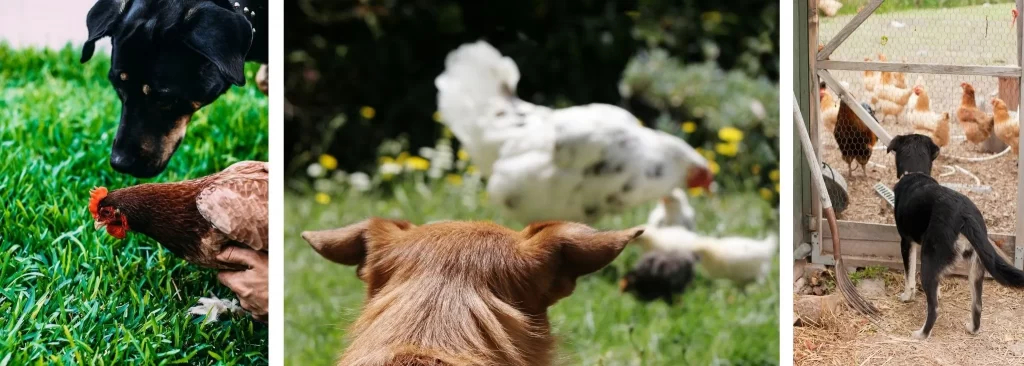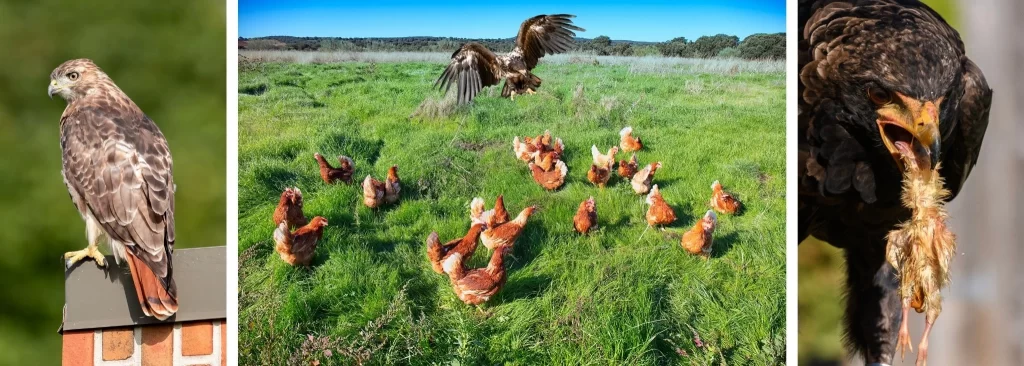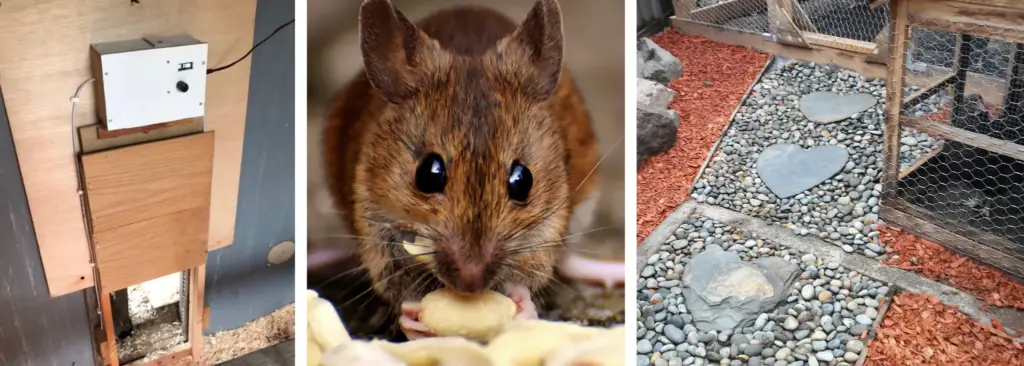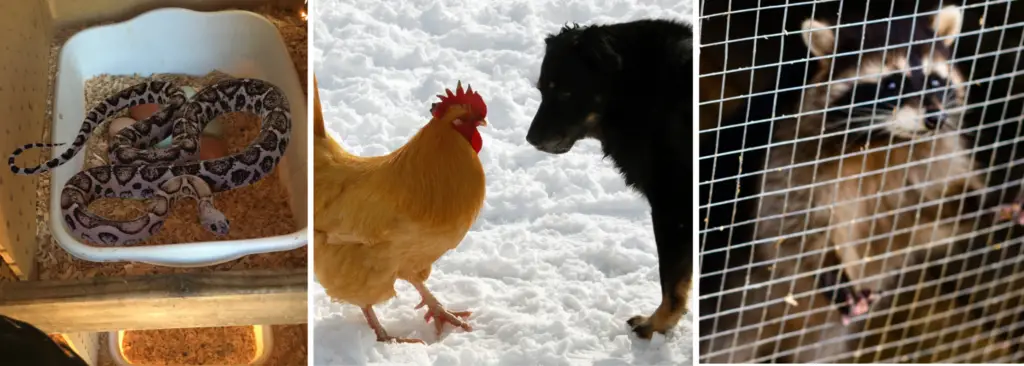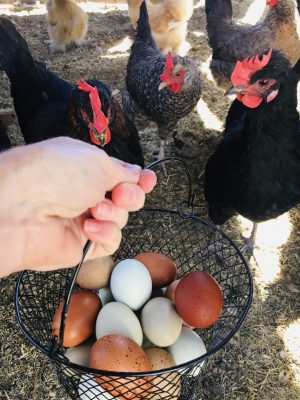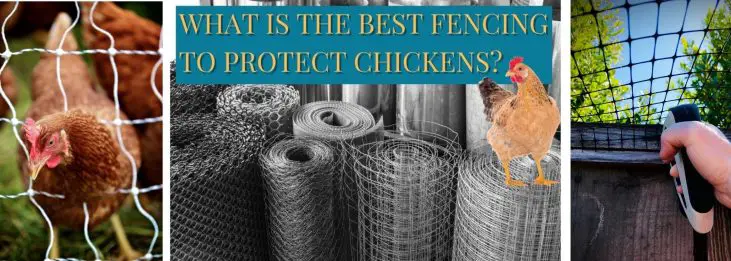
What is the best fencing to protect chickens? Depending upon where you live, what type of predators are in your area, amount of supervision and money you have to spend on your chickens will determine what type of fencing will work best for you. Top choices are hardware cloth, chicken wire, hawk netting, chain-link and electric fencing.
You have invested a lot of money and time into your flock and the last thing that you want is to have them attacked by predators.
Not everyone is able to design a “Fort Knox” type chicken coop to protect their flock. But if you are going to own chickens, you should know what fencing is available to protect them and do your best to do so.
Chicken Fencing Material Cost
| FENCING MATERIAL | COST |
|---|---|
| 1/4″ HARDWARE CLOTH 2’X25′ | $51.45 |
| 1/2″ HARDWARE CLOTH 2’X25′ | $35.95 |
| CHICKEN WIRE 2’X25′ | $14.88 |
| HAWK NETTING 7’X20′ | $15.43 |
| CHAIN-LINK FENCING 6’X50′ | $107.00 |
| ELECTRIC FENCING 48″X82′ | $319.99 |
1. Hardware Cloth as Fencing to Protect Your Chickens
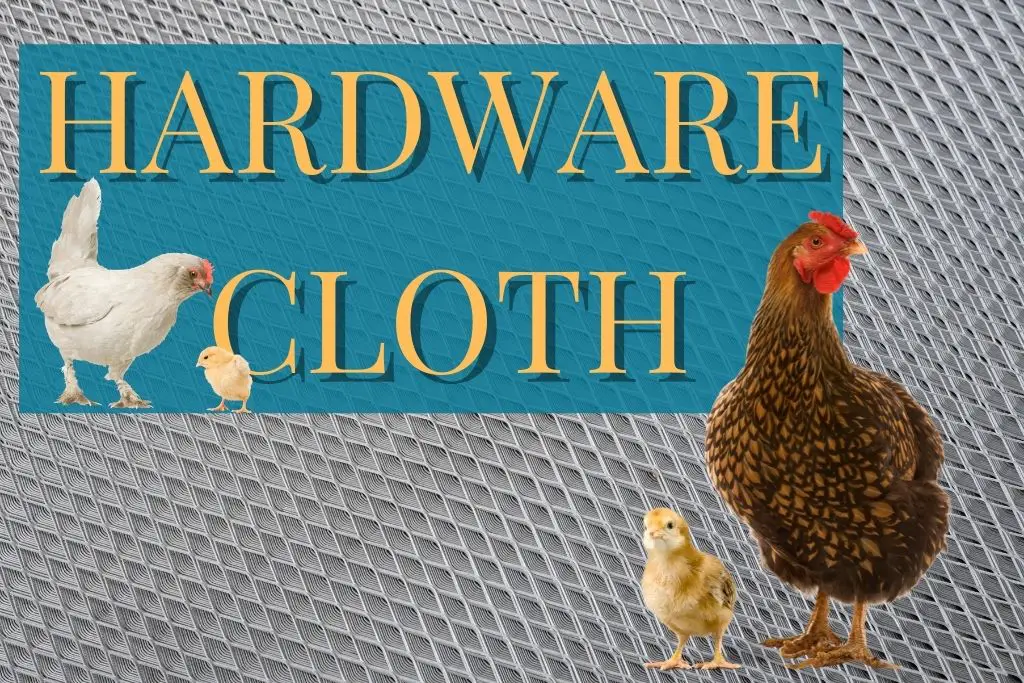
Hardware cloth is at the top of the list of fencing materials that will protect your chickens inside their chicken coop and run. It is also one of the more expensive one’s.
| PREDATOR | WILL HARDWARE CLOTH PROTECT YOUR CHICKENS? |
|---|---|
| RACCOONS | YES |
| BIRDS OF PREY | YES (MUST BE ENCLOSED ABOVE TOO) |
| COYOTES | YES |
| FOX | YES |
| OPPOSSUMS | YES |
| RATS | YES |
| MICE | YES 1/4″ NO 1/2″ |
| SNAKES | YES 1/4″ NO 1/2″ |
| DOGS & CATS | YES |
| MOUNTAIN LION | YES |
| BOBCATS | YES |
| WEASLES | YES |
| MINK | YES |
| BEAR | NO |
What is Hardware Cloth?
Hardware cloth is a wire mesh, made of galvanized steel, stainless steel or bare steel. It comes in different sizes, with 1/4″ and 1/2″ square openings being the two most common sizes used for coops and chicken runs.
Because of the durability and strength of hardware cloth, it is highly recommended for the use of fencing for chicken coops and runs as well as around the perimeter of their enclosures(to deter digging predators).
PROS of Using Hardware Cloth to Protect Chickens
- Hardware cloth is one of the best fencing materials to deter most chicken predators.
- It is extremely durable.
- It is long lasting.
- Hardware cloth is corrosion resistant.
CONS of Using Hardware Cloth to Protect Chickens
- It is one of the more expensive fencing materials to deter chicken predators.
How to Put Hardware Cloth On the Chicken Run
- Wear gloves when working with hardware cloth. The ends can be quite sharp!
- Use a pair of tin snips to cut the cloth. (Regular scissors will not work.)
- Install hardware cloth on all sides of the chicken run.
- Having a helper to hold one end while you are applying the staples will help a lot!
- 1/4″ hardware cloth is recommended because it is small enough to keep small snakes and mice from getting in as well as little raccoon hands from reaching in and grabbing a chicken.
- If you can’t get any 1/4″ hardware cloth, 1/2″ will do. (It is just as strong as 1/4″ and it will deter most predators, with the exception of small snakes, mice and the hands of raccoons.)
- Use a staple gun to secure it to the 2″x4″ framework of the chicken run.
- Put a staple at least every 12″ to secure it to the chicken run framework.
- Raccoons are good climbers, so make sure that the hardware cloth completely covers all sides of the chicken run, including the eves. (Full grown adult raccoons are known to be able to squeeze their whole body through a 4-5 inch opening.)
How to Install Hardware Cloth Around Perimeter of Chicken Coop and Run
- For extra protection from digging predators, dig a trench 12″ deep around the entire perimeter of your chicken run.
- Install 12″ of hardware cloth, stapling it to the bottom framework of the run.
- Bury the hardware cloth.
- This will help to deter animals such as dogs, raccoons, fox and coyotes.
2. Does Chicken Wire Really Protect Your Chickens?
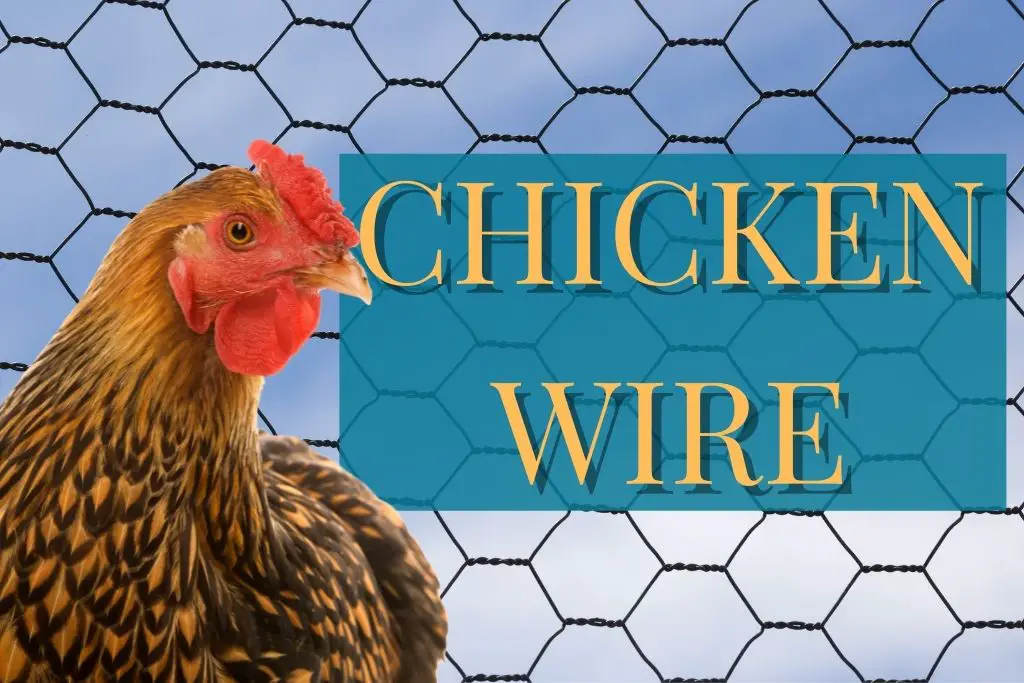
Most people think that because it is called “chicken wire,” it is the best protection for a chicken, but this is not true. Chicken wire works well at keeping chicken inside their enclosure, but it does not protect them from most predators getting inside.
What is Chicken Wire?
Chicken wire is made of galvanized steel or stainless steel and is commonly used as fencing for chicken coops and runs. It is a flexible wire that has 1″ or 2″ hexagon shaped openings. It comes in different thicknesses, ranging from 19-22 gauge.
Because of chicken wire flexibility and large hole size, it does not keep determined predators from getting inside. Small rodents and animals can fit through or chew through the wire and strong animals can break through it.
| PREDATOR | WILL CHICKEN WIRE PROTECT YOUR CHICKENS? |
|---|---|
| RACCOONS | NO |
| BIRDS OF PREY | YES(IF PROTECTED FROM UP ABOVE) |
| COYOTES | NO |
| FOX | NO |
| OPPOSSUMS | NO |
| RATS | NO |
| MICE | NO |
| SNAKES | NO |
| DOGS & CATS | YES |
| MOUNTAIN LION | NO |
| BOBCATS | NO |
| WEASLES | NO |
| MINK | NO |
| BEAR | NO |
3. Using Hawk Netting to Protect Your Chickens
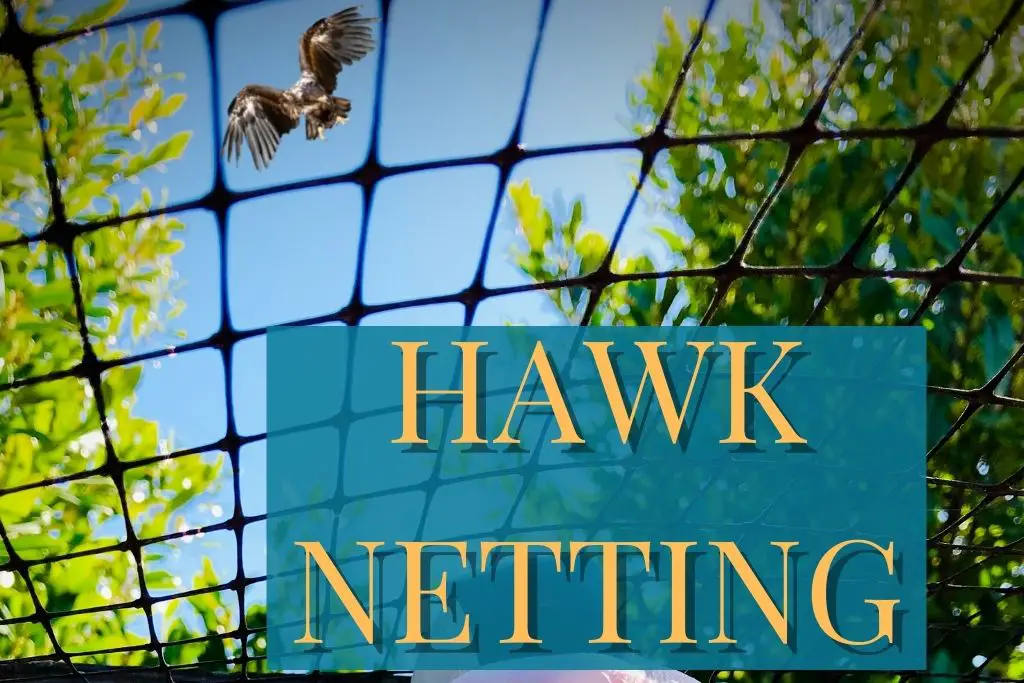
What Types of Aerial Predators Does Hawk Netting Protect Chickens From?
Hawk netting is meant to protect your chickens from aerial predators such as hawks, owls, falcons, large black birds and eagles. It is also good at deterring wild birds from entering a chicken run and passing many different diseases to your flock.
It is used to drape over the top of a chicken run to deter aerial predators from swooping down and attacking your flock.
PROS of Using Hawk Netting to Protect Your Chickens
- Hawk netting will protect your chickens from aerial predators.
- It helps to deter wild birds from entering the chicken run.
- Hawk netting is easy to install with a staple gun.
- It is easy to cut with scissors.
- It is safe for your chickens.
- Hawk netting is long lasting.
- Most netting is made from a durable, nylon multifilament.
- It is not expensive.
CONS of Using Hawk Netting to Protect Your Chickens
- Hawk netting does not protect chickens from most land predators.
- While it may be durable, rodents such as mice, rats, squirrels and raccoons can still chew through it.
Birds of prey have excellent eyesight and can see a free-ranging chicken from over a mile away. A red-tailed hawk can swoop down at up to 120 MPH, use its razor sharp talons to penetrate a chicken and make its kill.
Birds are designed in a way to give them much better eyesight than humans. For instance, a Red Tailed Hawk can see about 8 times better than we can.
How Does Hawk Netting Work?
When an aerial predator is soaring from up above, hawk netting over a chicken run looks impenetrable to it. Hawk netting looks much bigger and stronger to them, making it a great deterrent and perfect to place on top of a chicken run.
4. Will Chain-Link Fencing Protect Chickens?
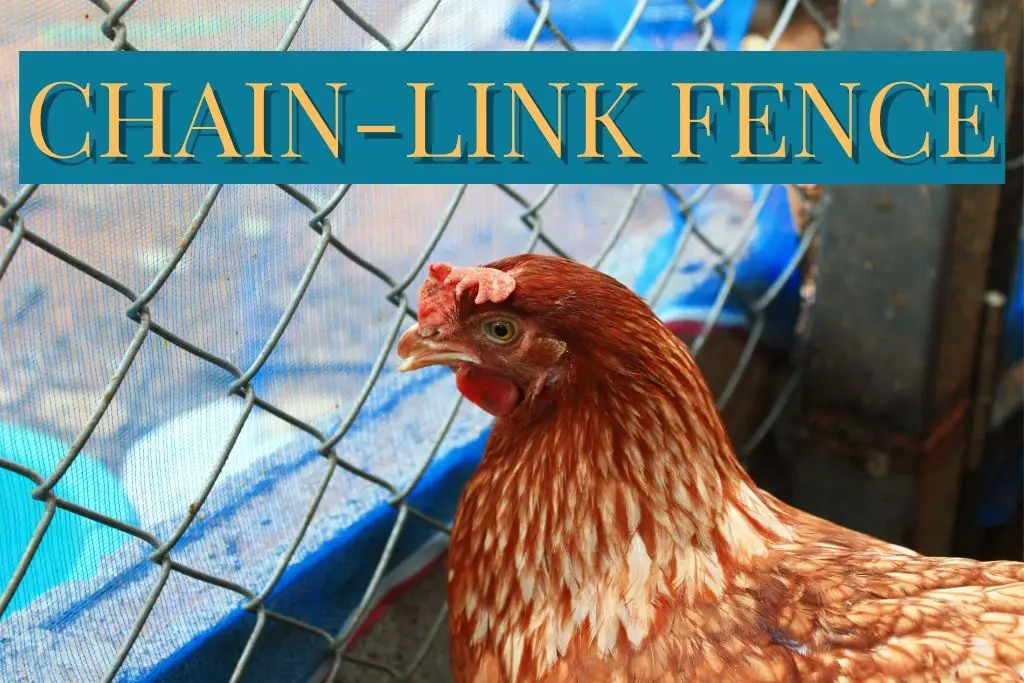
- Chain-link fencing is usually made of galvanized steel.
- Other names for it include “chain-wire fence” and “cyclone fence.”
- sold in 3′-12′ heights
- 2″ diamond openings
- kind of pricey
It is typically seen around schools, tennis courts and many dog runs are made up from this type of fencing.
If you have an old dog run laying around that you would like to convert to a chicken run, it can be done, but does require some modifications to make it a little more predator proof.
Chain-link fencing will not protect your chickens from raccoons, snakes, weasels, mice and rats.
If you can, get a 4′ roll of 1/4″ hardware cloth and run it around the perimeter of your chain-link chicken run and coop.
Raccoons are known to reach their tiny little paws through fencing to grab and pull parts of chicken out of their enclosure to eat. 1/4″ hardware cloth is too tiny for them to get their paws through.
5. Using Electric Fencing-“Poultry Netting” to Protect Chickens
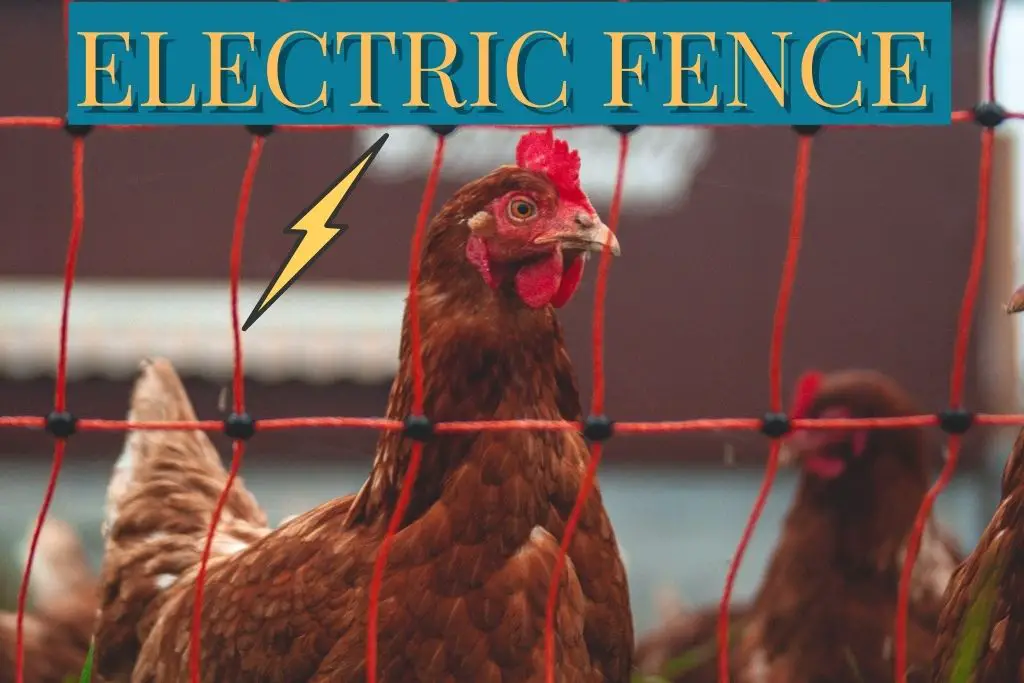
Electric fencing or electrified “poultry netting” is a prefabricated 4′-6′ fence with electrified wires. It works by sending an electric shock, around 3,000 volts, to whatever touches it. It helps to keep your poultry in and predators out.
PROS of Using Electric Poultry Netting
- Most animals that touch it, learn and stay away.
- It works well at keeping poultry inside the fencing and predators out.
- Simple to move.
- One person can install.
- Allows your flock ability to “free range,” protected from outside predators.
CONS of Using Electric Poultry Netting
- Electric fencing does not protect chickens from aerial predators.
- Chickens can get tangled up in the wire and die.
- Does not contain baby chicks.
- You need to remember to turn it off before touching it.
- You need to remember to turn it back for it to be effective.
- Flighty birds and birds that are spooked can escape.
Do Electric Fences Work for Chickens?
Electric fences, if installed properly, are both safe and highly effective at keeping your chickens in and most predators out.
| PREDATOR | WILL ELECTRIC FENCING PROTECT YOUR CHICKENS? |
|---|---|
| RACCOONS | YES |
| BIRDS OF PREY | NO |
| COYOTES | YES |
| FOX | YES |
| OPPOSSUMS | YES |
| RATS | YES |
| MICE | YES |
| SNAKES | YES |
| DOGS & CATS | YES |
| MOUNTAIN LION | YES |
| BOBCATS | YES |
| WEASLES | YES |
| MINK | YES |
| BEAR | YES |
I highly recommend looking into Premier 1 Poultry Electric Netting. They are of excellent quality and simple to install.
How Can I Protect My Free Range Chickens from Predators?
Using electrified poultry netting is a simple way to allow your chickens the ability to free range, but still protect them from most outside predators. In addition to using electrified poultry netting, provide areas for your chickens to take cover from aerial predators or use hawk netting up above your electric fencing.
How High Does a Fence for Chickens Need to Be to Keep them In?
The best height for a chicken fence needs to be a minimum of 4 feet tall to keep chickens in. For flighty or more aggressive chickens it should be at least 6 feet tall. Proper fencing material is necessary to protect predators from getting inside a chicken coop or run though.
CONCLUSION: What is the Best Fencing to Protect Chickens? [2023]
Part of being a responsible owner of chickens is protecting them from outside predators. Know what types of predators are in your area and choose the best type of fencing that will work to keep them safe.
- Hardware Cloth is best for keeping chickens in and predators out.
- Chicken Wire works best to keep chickens in.
- Hawk Netting is best to deter aerial predators.
- Chain-Link Fencing will not protect against snakes, mice, rats, skunks, raccoons and weasels. Use hardware cloth around bottom 4′ of chicken run and around the perimeter of the coop for additional protection from predators.
- Electric Fencing-works great for keeping most land predators out, but doesn’t protect against aerial predators.

